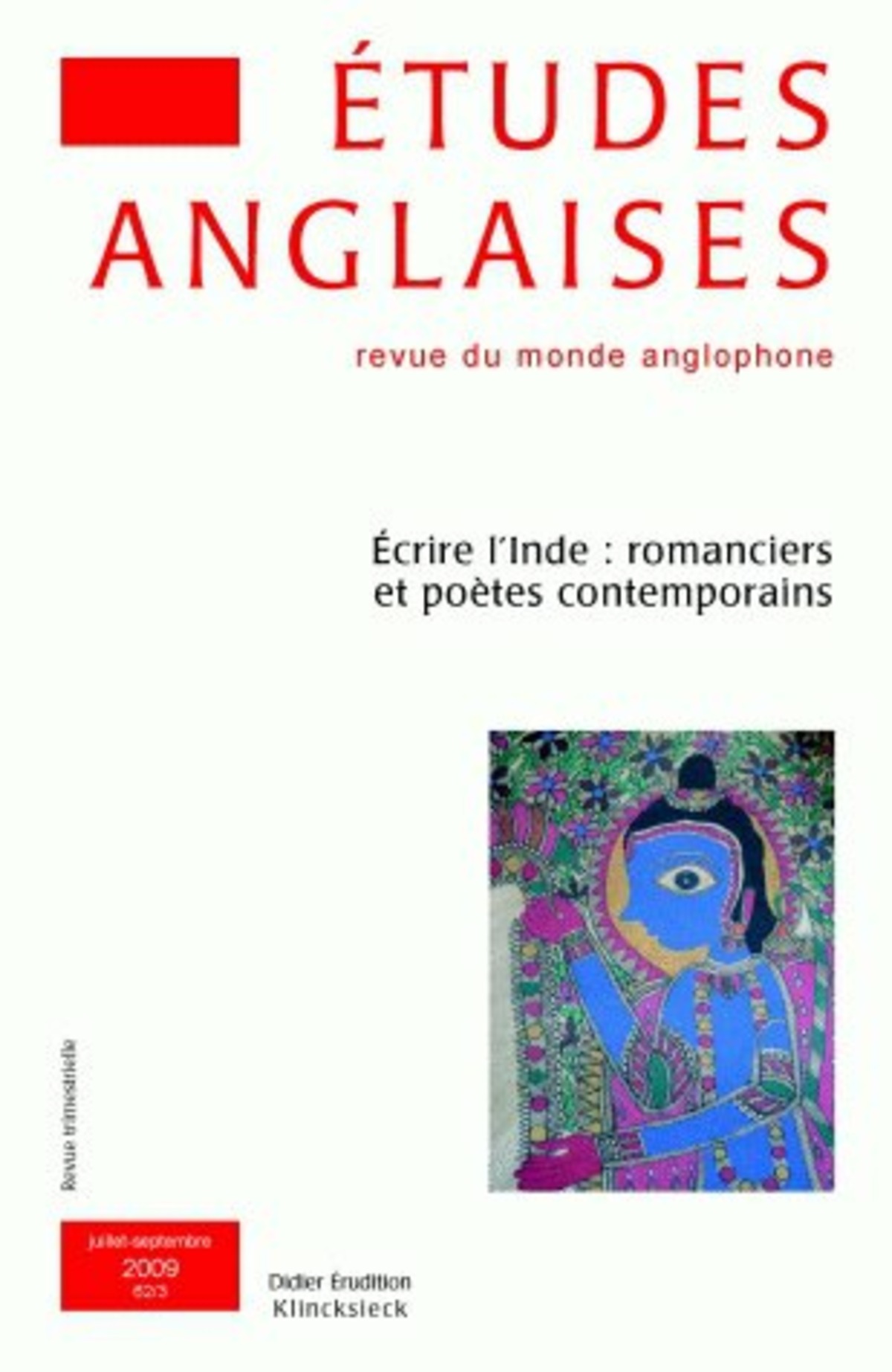Études anglaises - N°3/2009
Écrire l'Inde : romanciers et poètes contemporains

- 128 pages
- Livre broché
- 15 x 23 cm
- Études anglaises
- Parution : 23/11/2009
- CLIL : 3146
- EAN13 : 9782252036952
- Code distributeur : 34393
Présentation
Supriya CHAUDHURI, Translating Loss: Place and Language in Amitav Ghosh and Salman Rushdie
Place, in the work of the postcolonial writer, is most often viewed under the sign of loss: either as threatened or as beyond recovery. If, as I suggest, this has something to do with the sense of loss attending all linguistic representation, it is most haunting and insistent in the act of translation. Beginning with some remarks on Milan Kundera's L'Ignorance (2000), a novel that examines questions of language, place and identity, this essay proceeds to analyse how two writers from the Indian subcontinent, Amitav Ghosh and Salman Rushdie, use language to mediate a sense of place in their writing. Focusing on Ghosh's The Hungry Tide (2004) and Rushdie's Shalimar the Clown (2005), two contemporary works that are strongly contrasted in terms of style, politics, language and treatment of landscape, I examine the consequences of translating experiences undergone in one language through the medium of another. Through this analysis, the essay seeks to arrive at some conclusions regarding writing, translation, and being-at-home in the world.
Dans l'œuvre des écrivains post-coloniaux, le lieu apparaît souvent sous le signe de la perte : il est menacé, ou déjà perdu. Cela est dû à la perte qui accompagne toute représentation linguistique et qui est exacerbée dans le cas de la traduction. Prenant pour point de départ le roman de Milan Kundera, L'Ignorance, qui aborde les questions du langage, du lieu et de l'identité, cet article analyse la façon dont deux écrivains du sous-continent indien, Amitav Ghosh et Salman Rushdie, utilisent le langage pour s'inscrire dans l'espace. En m'appuyant principalement sur The Hungry Tide (2004) de Ghosh et Shalimar the Clown (2005) de Rushdie, j'analyse les conséquences de la traduction d'expériences vécues dans une langue vers une autre langue. Cette analyse s'interroge enfin sur l'écriture, la traduction, et le rapport du sujet au monde.
Ankhi MUKHERJEE, "Yes, sir, I was the one who got away": Postcolonial Emergence and the Question of Global English
In this essay, I use three novels published to wide acclaim in the last two years―Aravind Adiga's White Tiger (2008), Mohammed Hanif's A Case of Exploding Mangoes (2008), and Mohsin Hamid's The Reluctant Fundamentalist (2007)―as case studies for the deterritorialization of the twenty-first-century Indian and Pakistani novel in English. I focus particularly on the phenomenon of minority lives told in a major language, and show how Western literary forms and Standard English are restructured in the postcolonial, English-language, narrative voice.
Cet article analyse trois romans extrêmement bien reçus par la critique ces deux dernières années (White Tiger [2008] de Aravind Adiga, A Case of Exploding Mangoes [2008] de Mohammed Hanif et The Reluctant Fundamentalist [2007] de Mohsin Hamid), en les considérant comme des études de cas pour une analyse de la déterritorialisation du roman indien et pakistanais en anglais du XXIe siècle. Il se concentre en particulier sur le phénomène des vies minoritaires décrites dans une langue majoritaire, et montre la façon dont les formes littéraires, ainsi que l'anglais standard, sont restructurés au sein de la voix narrative post-coloniale en anglais.
Cécile Girardin, The Inheritance of Modernity: Insurgencies in Contemporary Indian Fiction
Several novels of the 2000s (Magic Seeds, The Inheritance of Loss, An Iron Harvest and The Hungry Tide) feature Marxist-inspired insurgencies in several Indian states, thereby creating a bleak portrayal of political involvement and representation. Fiction highlights the dislocation between ideals and the actual violence created by these conflicts, as well as the linguistic disintegration that takes place when affects and emotions occupy the political stage. While the Indian novel has often celebrated difference and contestation, this political nonsense allows the writers to think anew the relationship of the individual to history.
Plusieurs romans des années 2000 (Magic Seeds, The Inheritance of Loss, An Iron Harvest et The Hungry Tide) font figurer des insurrections de type marxiste dans plusieurs régions de l'Inde, et dressent un portrait sombre de l'engagement et de la représentation politiques. La fiction permet de dessiner la dislocation entre les idéaux et la violence, réelle, disséminée par ces conflits, ainsi que le délitement du langage, quand les émotions et l'affect occupent toute la scène politique. Alors que le roman indien semblait souvent célébrer la différence et la contestation, ces non-sens politiques permettent de repenser radicalement la relation de l'individu à l'histoire.
Vanessa Guignery, “Step Across This Line”: Edges and Borders in Contemporary Indian Literature
This essay analyses the ways in which contemporary Indian literature in English addresses the poetics of the border in the aftermath of colonialism and in the context of the new configurations of a global world, viewed both as a zone of transnational migrations but also as a place where communal divides are violently reasserted. On the one hand, Indian novels acknowledge the rigid lines and frames which define the individual, society and the nation, providing a sense of stability but also of fixity and enclosure. On the other hand, they suggest lines of flight which challenge binary divisions and arbitrary partitions, and favour instead the blurring and transgression of frontiers. Through this tension between the evocation and eradication of boundaries, Indian contemporary literature re-imagines the border as a contingent, transitory and fluid place, a space of becoming rather than a stable limit.
Cet article analyse les modes selon lesquels la littérature indienne contemporaine aborde la poétique de la frontière dans le contexte postcolonial et dans celui des nouvelles configurations d'un ordre mondial conçu comme une zone de migrations transnationales où les tensions communautaires s'affirment toutefois violemment. D'une part, les romans indiens prennent acte des lignes dures et des cadres qui définissent l'individu, la société et la nation, et offrent un sentiment de stabilité mais aussi de fixité et d'enfermement. D'autre part, ils suggèrent des lignes de fuite qui remettent en question les divisions binaires et les partitions arbitraires, et favorisent au contraire le brouillage et la transgression des limites. Par le biais de cette tension entre le rappel et la suppression des lignes de démarcation, la littérature indienne contemporaine reconfigure la frontière en tant qu'espace contingent, éphémère et fluide, un devenir-lieu plutôt qu'une limite stable.
Laetitia ZECCHINI, Indian Poetry in English: From the Trauma of Estrangement to a Poetics of Strangeness
This article frames Indian poetry in English in the broader context of poetry and literature in other Indian languages in the second half of the twentieth century till today. It concentrates on the works of the two Bombay poets Adil Jussawalla (born in 1940) and Arun Kolatkar (1932-2004), and argues that the poetry of estrangement born from historical rifts, a dislocated conscience, the disquieting otherness of the self and the chaos of reality outside, seems to have given way to a poetics of strangeness. Kolatkar's poetry is exemplary to show how dislocation, impermanence, impropriety and historicity combine to forge the unknown from the most familiar, to renovate our vision of the world, and restore reality to existence and consciousness. Strangeness is at the heart of perception and belonging.
Cet article situe la poésie indienne contemporaine de langue anglaise dans le contexte plus large de la littérature et de la poésie dans les autres langues indiennes, à partir de la seconde moitié du vingtième siècle jusqu'à aujourd'hui. Il montre que l'étrangeté comme valeur et comme poétique a aujourd'hui remplacé l'aliénation, la distanciation et la non-appartenance nourries par les disjonctions de l'histoire, par les sentiments de dislocation intime, de chaos ou d'inquiétante altérité du monde extérieur, que la poésie des années soixante et soixante-dix pouvaient mettre en évidence. L'analyse s'appuie sur l'œuvre de deux poètes de Bombay : Adil Jussawalla (né en 1940) et Arun Kolatkar (1932-2004). La poésie de Kolatkar se fonde sur l'impermanence, le désagencement, l'opacité, l'entrelacement créatif et l'historicité pour forger de l'inconnu, renouveler notre regard sur le monde et faire émerger la réalité, aussi familière ou négligeable soit-elle, à la conscience et à l'émerveillement. L'étrangeté est au cœur de la perception et de l'appartenance.
Annie MONTAUT, But why do you write in Hindi ?
Writing in Hindi is often considered a negative choice since English is claimed to be a panindian language and is definitely a more prestigious means of expression than Indian languages. One is presumed to write in Hindi, or for that matter in a regional Indian language, either if one is unable to write in English or for chauvinistic reasons. This paper firstly aims at deconstructing these negative reasons by trying to unfold the historical causes for establishing English as a prestige language in India; secondly at providing some positive reasons for writing in Hindi (or regional languages), in relation to the nature of literary cultures of India, which are neither dictated by the modernistic concept of nation and state nor by the postmodern or postcolonial reshaping of the literary field.
Écrire en hindi est souvent considéré comme un choix par défaut, car on soutient que l'anglais est à la fois une langue panindienne et un moyen d'expression plus prestigieux que les langues indiennes. On n'écrit en hindi, ou dans une langue indienne régionale, que si on n'est incapable d'écrire en anglais, ou pour des raisons nationalistes. Cet article déconstruit en premier lieu ces arguments, en faisant apparaître les causes historiques du prestige de l'anglais en Inde. Il montre ensuite les raisons positives qu'il peut y avoir à écrire en hindi, ou en une autre langue régionale, en relation avec la nature des cultures littéraires de l'Inde. Celles-ci ne sont pas gouvernées par un concept moderniste de la nation et de l'état, ni par une redéfinition postmoderne ou postcoloniale du champ littéraire.
Udaya KUMAR, Two Figures of Shame: Exposure, Ethics, and Self-Narration
Taking the public dimension of autobiographical writing as its point of departure, this paper examines two instances of shame in Indian autobiography, where the subject experiences incoherence and dislocation. The paper discusses the tropes of vulnerability and self-shaming in Gandhi's autobiography alongside moments of forced shaming or humiliation in contemporary Dalit self-narratives. It concludes by speculating on the possibility of an ethical reconsideration of shame which may go beyond a dichotomous frame of perpetrators and victims.
En prenant pour point de départ la dimension publique de l'autobiographie, cet article étudie deux exemples de la honte dans l'autobiographie indienne, où le sujet fait l'expérience de l'incohérence et la dislocation. Cet article analyse les tropes de la vulnérabilité et de la honte auto-infligée, dans l'autobiographie de Gandhi, en même temps que des moments de honte ou d'humiliation forcée dans les autobiographies Dalit. Il conclut sur la possibilité d'un réexamen éthique de la honte qui irait au-delà d'une dichotomie opposant bourreaux et victimes.
Marta DVORÁK, Contemporary Indian Fiction and the Dynamics of Cross-Cultural Collocation
By engaging with the self-reflexive strategies of multiple viewpoints, multivocality and transtextuality, and by addressing the dialogical process between producer and receptor, this paper investigates how contemporary Indian fiction from Desai's and Ondaatje's to Man Booker Prize-winner Aravind Adiga's (2008), but also postcolonial fiction in general, articulate and negotiate meaning in our postmodern globalized world.
Étudiant les stratégies métatextuelles telles que les perspectives multiples, la polyphonie, et la transtextualité, et explorant le processus dialogique qui lie l'émetteur et le récepteur, cet essai place la littérature indienne contemporaine (de Desai à Adiga, lauréat du Man Booker Prize 2008) dans le contexte plus général des nouvelles littératures qui ont accentué les pratiques intertextuelles classiques et souligné la circulation du sens.
Biographies Contributeurs
Alexis Tadié
Professeur d'anglais à l'Université Paris 7-Denis Diderot (en 2003) ; Directeur de la Maison française d'Oxford et Fellow de St-Catherine's College à Oxford (en 2005)




